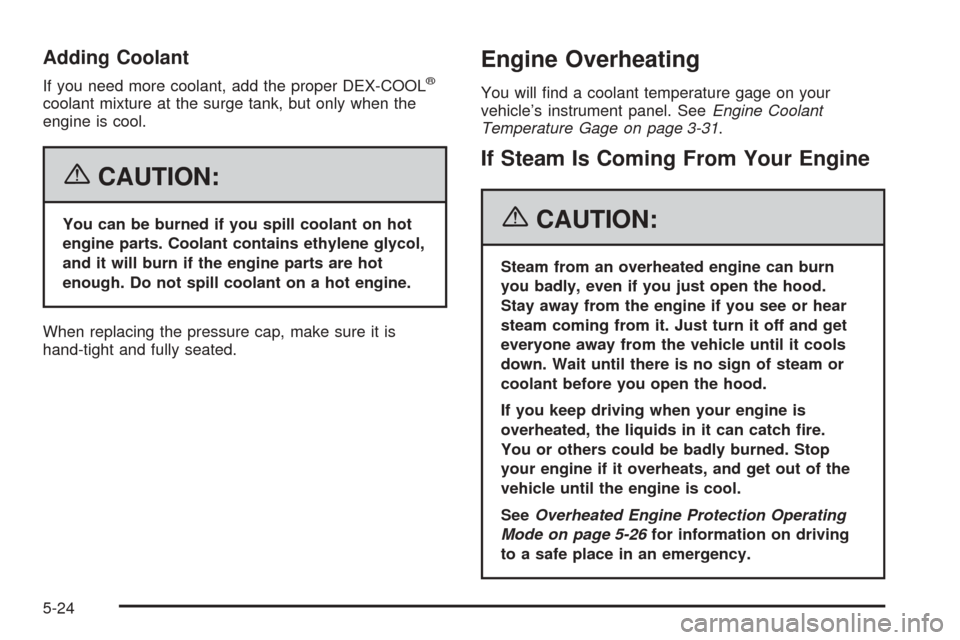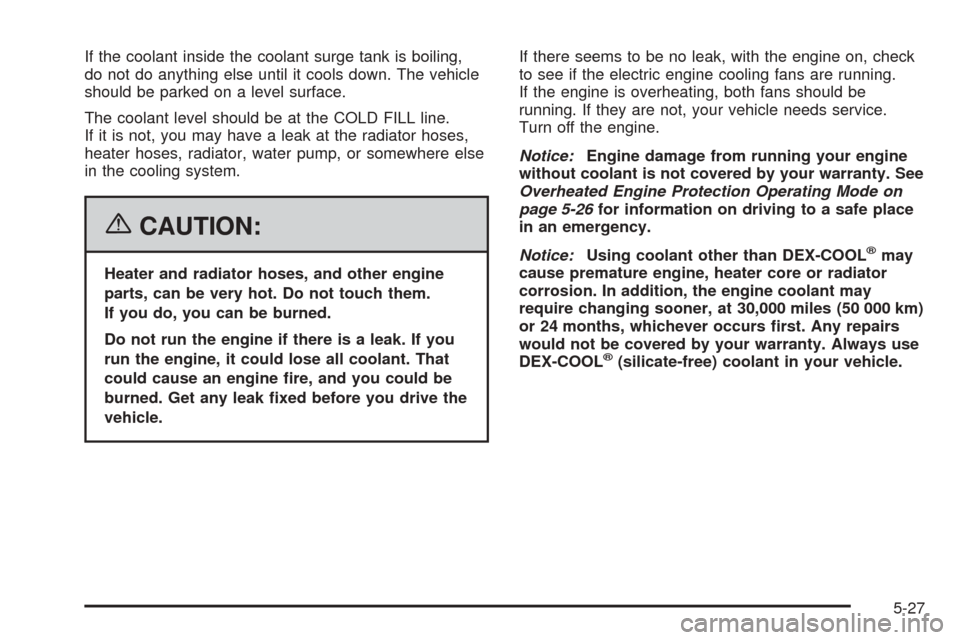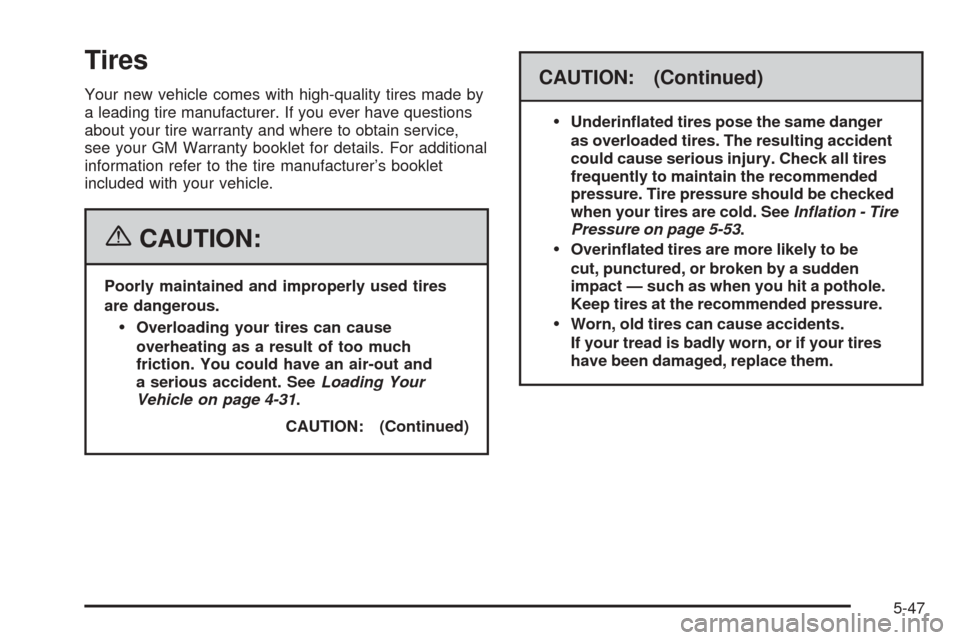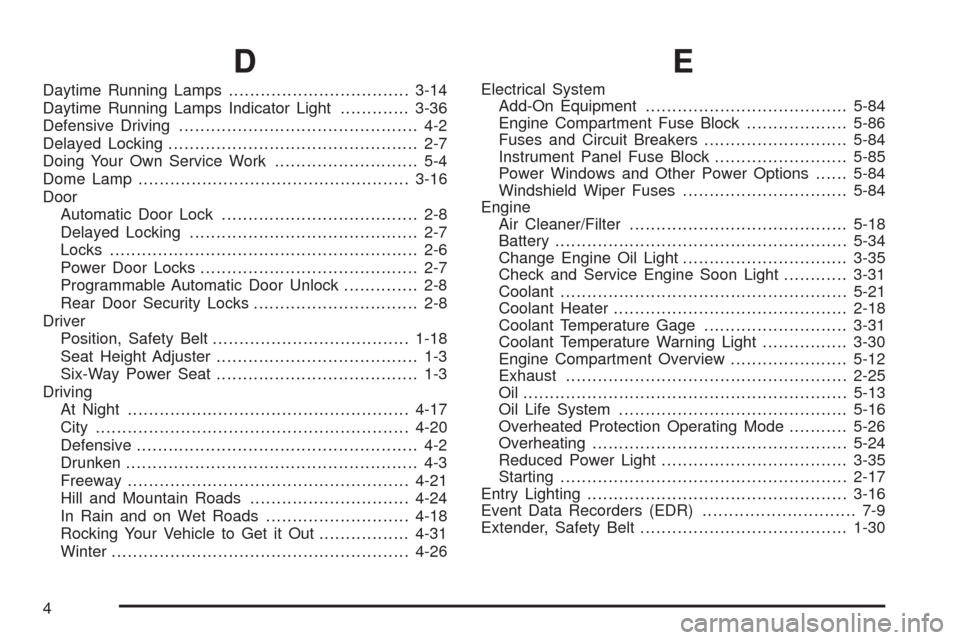Page 270 of 382

Adding Coolant
If you need more coolant, add the proper DEX-COOL®
coolant mixture at the surge tank, but only when the
engine is cool.
{CAUTION:
You can be burned if you spill coolant on hot
engine parts. Coolant contains ethylene glycol,
and it will burn if the engine parts are hot
enough. Do not spill coolant on a hot engine.
When replacing the pressure cap, make sure it is
hand-tight and fully seated.
Engine Overheating
You will �nd a coolant temperature gage on your
vehicle’s instrument panel. SeeEngine Coolant
Temperature Gage on page 3-31.
If Steam Is Coming From Your Engine
{CAUTION:
Steam from an overheated engine can burn
you badly, even if you just open the hood.
Stay away from the engine if you see or hear
steam coming from it. Just turn it off and get
everyone away from the vehicle until it cools
down. Wait until there is no sign of steam or
coolant before you open the hood.
If you keep driving when your engine is
overheated, the liquids in it can catch �re.
You or others could be badly burned. Stop
your engine if it overheats, and get out of the
vehicle until the engine is cool.
SeeOverheated Engine Protection Operating
Mode on page 5-26for information on driving
to a safe place in an emergency.
5-24
Page 273 of 382

If the coolant inside the coolant surge tank is boiling,
do not do anything else until it cools down. The vehicle
should be parked on a level surface.
The coolant level should be at the COLD FILL line.
If it is not, you may have a leak at the radiator hoses,
heater hoses, radiator, water pump, or somewhere else
in the cooling system.
{CAUTION:
Heater and radiator hoses, and other engine
parts, can be very hot. Do not touch them.
If you do, you can be burned.
Do not run the engine if there is a leak. If you
run the engine, it could lose all coolant. That
could cause an engine �re, and you could be
burned. Get any leak �xed before you drive the
vehicle.If there seems to be no leak, with the engine on, check
to see if the electric engine cooling fans are running.
If the engine is overheating, both fans should be
running. If they are not, your vehicle needs service.
Turn off the engine.
Notice:Engine damage from running your engine
without coolant is not covered by your warranty. See
Overheated Engine Protection Operating Mode on
page 5-26for information on driving to a safe place
in an emergency.
Notice:Using coolant other than DEX-COOL
®may
cause premature engine, heater core or radiator
corrosion. In addition, the engine coolant may
require changing sooner, at 30,000 miles (50 000 km)
or 24 months, whichever occurs �rst. Any repairs
would not be covered by your warranty. Always use
DEX-COOL
®(silicate-free) coolant in your vehicle.
5-27
Page 293 of 382

Tires
Your new vehicle comes with high-quality tires made by
a leading tire manufacturer. If you ever have questions
about your tire warranty and where to obtain service,
see your GM Warranty booklet for details. For additional
information refer to the tire manufacturer’s booklet
included with your vehicle.
{CAUTION:
Poorly maintained and improperly used tires
are dangerous.
Overloading your tires can cause
overheating as a result of too much
friction. You could have an air-out and
a serious accident. SeeLoading Your
Vehicle on page 4-31.
CAUTION: (Continued)
CAUTION: (Continued)
Underin�ated tires pose the same danger
as overloaded tires. The resulting accident
could cause serious injury. Check all tires
frequently to maintain the recommended
pressure. Tire pressure should be checked
when your tires are cold. SeeInflation - Tire
Pressure on page 5-53.
Overin�ated tires are more likely to be
cut, punctured, or broken by a sudden
impact — such as when you hit a pothole.
Keep tires at the recommended pressure.
Worn, old tires can cause accidents.
If your tread is badly worn, or if your tires
have been damaged, replace them.
5-47
Page 331 of 382
Instrument Panel Fuse Block
The instrument panel fuse block is located on the
passenger’s side of the center console, to the left
of the glove box near the �oor.
Fuses Usage
LOCK/MIRROR Door Lock, Power Mirror
CRUISE Cruise Control System
EPS Electric Power Steering
IGN 1 Switches, Instrument Panel Cluster
PRNDL/PWR
TRNPRNDL/Powertrain
BCM (IGN) Body Control Module
AIRBAG Airbag System
BCM/ISRVMBody Control Module, Inside
Rearview Mirror
TURN Turn Signals
HTD SEATS Heated Seats
BCM/HVACBody Control Module, Heating,
Ventilation and Air Conditioning
HZRD Hazard Warning Flashers
RADIO Radio
PARK Parking Lamps
5-85
Page 332 of 382
Fuses Usage
BCM/CLSTRBody Control Module, Instrument
Panel Cluster
INT LTS/
ONSTAR
®Interior Lights/OnStar®
DR LCK Door Locks
Relays Usage
PARK LAMP Parking Lamps Relay
HVAC
BLOWERHeating, Ventilation and Air
Conditioning Blower Motor
DR LCK Door Locks Relay
PASS DR
UNLOCKPassenger Door Unlock Relay
DRV DR
UNLCKDriver Door Unlock Relay
HEAD LAMP Headlamps
Engine Compartment Fuse Block
The engine compartment fuse block is located on the
driver’s side of the engine compartment.
SeeEngine Compartment Overview on page 5-12
for more information on location.
5-86
Page 333 of 382
Fuses Usage
HTD SEATS Heated Seats
HVAC
BLOWERHeating, Ventilation, Air Conditioning
Blower Control
PREM AUD Premium Audio System, Ampli�er
ABS PWR Anti-lock Brake System
RR WIPER Rear Window Wiper
FRT WIPER Front Window Wiper
SUNROOF Sunroof
ETC Electronic Throttle Control
PWR WDW Power Windows
A/C CLUTCH Air Conditioning Clutch
EMISS Emissions
ENG IGN Engine Ignition
CIGAR Cigarette Lighter
LH HDLP Driver’s Side Headlamp
COOL FAN HI Cooling Fan HighFuses Usage
ECM/TCMEngine Control Module, Transaxle
Control Module
AUX OUTLETS Accessory Power Outlets
FUSE PULLER Fuse Puller
INJ Fuel Injectors
PWR TRAIN Powertrain
FUEL PUMP Fuel Pump
A/C DIODE Air Conditioning Diode
TRAILER Trailer Lighting
BRAKE Brake System
RH HDLP Passenger’s Side Headlamp
HORN Horn
BACKUP Back-up Lamps
BATT FEED Battery
ABS Anti-lock Brake System
5-87
Page 372 of 382

D
Daytime Running Lamps..................................3-14
Daytime Running Lamps Indicator Light.............3-36
Defensive Driving............................................. 4-2
Delayed Locking............................................... 2-7
Doing Your Own Service Work........................... 5-4
Dome Lamp...................................................3-16
Door
Automatic Door Lock..................................... 2-8
Delayed Locking........................................... 2-7
Locks.......................................................... 2-6
Power Door Locks......................................... 2-7
Programmable Automatic Door Unlock.............. 2-8
Rear Door Security Locks............................... 2-8
Driver
Position, Safety Belt.....................................1-18
Seat Height Adjuster...................................... 1-3
Six-Way Power Seat...................................... 1-3
Driving
At Night.....................................................4-17
City...........................................................4-20
Defensive..................................................... 4-2
Drunken....................................................... 4-3
Freeway.....................................................4-21
Hill and Mountain Roads..............................4-24
In Rain and on Wet Roads...........................4-18
Rocking Your Vehicle to Get it Out.................4-31
Winter........................................................4-26
E
Electrical System
Add-On Equipment......................................5-84
Engine Compartment Fuse Block...................5-86
Fuses and Circuit Breakers...........................5-84
Instrument Panel Fuse Block.........................5-85
Power Windows and Other Power Options......5-84
Windshield Wiper Fuses...............................5-84
Engine
Air Cleaner/Filter.........................................5-18
Battery.......................................................5-34
Change Engine Oil Light...............................3-35
Check and Service Engine Soon Light............3-31
Coolant......................................................5-21
Coolant Heater............................................2-18
Coolant Temperature Gage...........................3-31
Coolant Temperature Warning Light................3-30
Engine Compartment Overview......................5-12
Exhaust.....................................................2-25
Oil .............................................................5-13
Oil Life System...........................................5-16
Overheated Protection Operating Mode...........5-26
Overheating................................................5-24
Reduced Power Light...................................3-35
Starting......................................................2-17
Entry Lighting.................................................3-16
Event Data Recorders (EDR)............................. 7-9
Extender, Safety Belt.......................................1-30
4